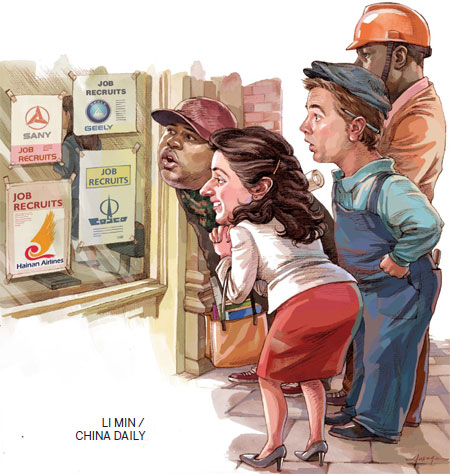Game changers
Updated: 2012-12-07 08:50
By Chen Weihua, Fu Jing, Zhang Chunyan and Li Xiang (China Daily)
|
||||||||

Chinese companies bring succor to job seekers amid tough economy
During the past decade, Chinese companies have taken several big strides like big-ticket mergers & acquisitions, joint ventures and even outright purchases of technologies and companies in overseas markets. But the biggest and most indelible impression left by the Chinese companies has been in steering the troubled economies of the US and Europe toward safety by adding and protecting jobs.
What makes the Chinese contribution noteworthy in the US and Europe is that despite being newcomers, and being subjected to frequent criticism on investment objectives, these companies have been almost the only ray of hope amid dismal economic indicators.
Foreign direct investment in the United States from China looks well on track to set a new record this year, despite some hurdles like the Ralls' lawsuit against President Barack Obama for blocking its wind farm project in Oregon and a congressional committee report casting national-security suspicions on two Chinese telecom equipment manufacturers, experts say.
Related readings:
Creating the right vibes
A beacon amid the gloom
Nourishing talent in Europe
During the first three quarters, FDI investment by Chinese enterprises in the US was around $6.3 billion, says a report released on Oct 18 by New York-based Rhodium Group, which tracks Chinese investments. The deal pipeline remains strong, with major acquisitions pending in aviation, auto parts and energy, according to Thilo Hanemann, research director of Rhodium.
According to a report published by the firm in September, the 600 Chinese investment transactions made between 2000 and 2012 in the US had created 27,000 jobs by the end of the second quarter, with another 1,000 jobs being added during the third quarter. The numbers do not even include US companies with minority Chinese investment or indirect jobs, such as those in construction for Chinese facilities and those at suppliers. It also excludes hourly workers.
|
Johan Cheval, account manager of Hainan Airlines Brussels Office, with the office's general manager Chen Mingqiong. Liu Jia / China Daily |
Real impact
Admitting that the actual Chinese impact on US jobs, in the light of several recent M&A deals, still remains hazy, the study says that the 170 transactions in which Chinese investors have majority control of US firms were "overwhelmingly positive".
"We see no evidence of asset-stripping behavior and find that most of the Chinese companies have maintained or added staff after acquiring companies in the US," Hanemann and his colleague Adam Lysenko say in the research report.
Unlike previous owners, Chinese investors were able to inject capital to maintain expenditure in times of crisis, bring better access to the fast-growing Chinese market and create synergies with existing operations in China that increased the value of US assets, they say.
Even the few acquisitions that have resulted in job losses have not been subject to asset stripping by Chinese companies, but were rather structural adjustment and reorganization of value chains to react to changes in costs or demand, the report says.
Although the 28,000 jobs associated with Chinese investment now make up less than 1 percent of the 6 million jobs created by US-based foreign affiliates, experts believe that the potential is huge, given that Chinese FDI is expected to increase dramatically in the coming decade.
The Rhodium report projects that if the US can attract $150 billion of Chinese global outbound investment by 2020, there will be 300,000 Americans on the payroll of Chinese US affiliates. It expects total Chinese outbound investment to hit $1 trillion by 2020.
In 2011, Chinese FDI in the US dropped to $4.5 billion from a record high of $5.2 billion in 2010. "While energy and advanced manufacturing continue to land the most investment dollars, 2012 deal flow suggests that Chinese investors are increasingly interested in US service firms, including entertainment, hospitality, finance and information technology," Hanemann says.
The report, however, noted that such a result should not be taken for granted. Chinese companies will invest in US companies, only if the US manages to sustain its attractiveness to foreign investors by fixing its structural problems.
"If fear mongering and populism gain the upper hand, Chinese firms may choose more hospitable investment destinations in Europe or Asia to expand their overseas business and generate jobs there," the report says.
Viking Weiqiong Tao of Dallas law firm Kane Russell Coleman & Logan, says that Chinese companies are now paying more attention to corporate social responsibility as they continue to seek greener investment options in overseas markets.
Chinese enterprises had spent $2.7 billion on 10 direct investments in the US in the third quarter. While the number of projects in the US is smaller than in previous quarters, the average size of transactions this year reached an unprecedented level.
The $2.6 billion acquisition of US cinema operator AMC Entertainment Holdings by Dalian Wanda Group, completed in early September, was the biggest overseas deal ever by a privately held Chinese company.

 Relief reaches isolated village
Relief reaches isolated village
 Rainfall poses new threats to quake-hit region
Rainfall poses new threats to quake-hit region
 Funerals begin for Boston bombing victims
Funerals begin for Boston bombing victims
 Quake takeaway from China's Air Force
Quake takeaway from China's Air Force
 Obama celebrates young inventors at science fair
Obama celebrates young inventors at science fair
 Earth Day marked around the world
Earth Day marked around the world
 Volunteer team helping students find sense of normalcy
Volunteer team helping students find sense of normalcy
 Ethnic groups quick to join rescue efforts
Ethnic groups quick to join rescue efforts
Most Viewed
Editor's Picks

|

|

|

|

|

|
Today's Top News
Chinese fleet drives out Japan's boats from Diaoyu
Health new priority for quake zone
Inspired by Guan, more Chinese pick up golf
Russia criticizes US reports on human rights
China, ROK criticize visits to shrine
Sino-US shared interests emphasized
China 'aims to share its dream with world'
Chinese president appoints 5 new ambassadors
US Weekly

|

|








